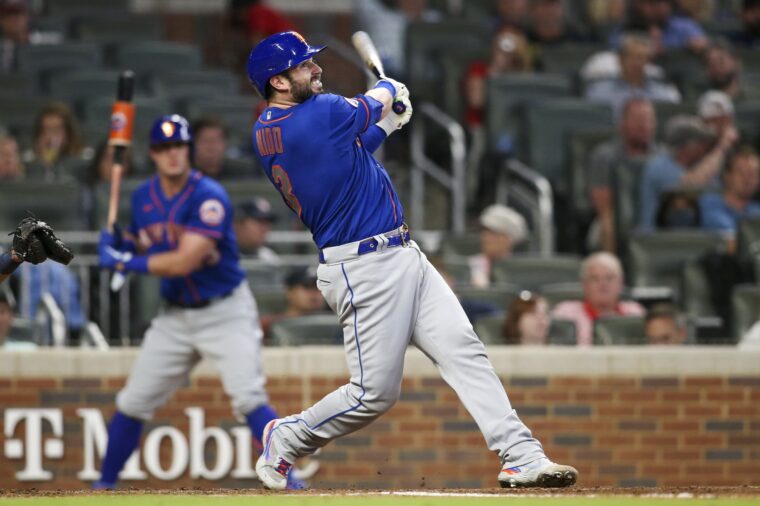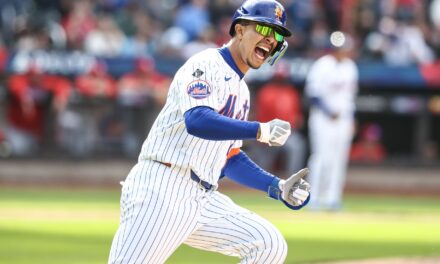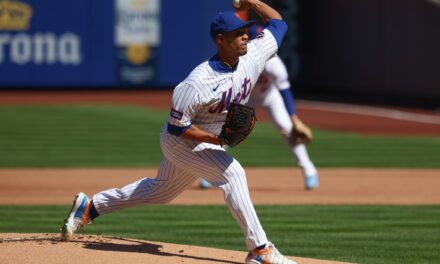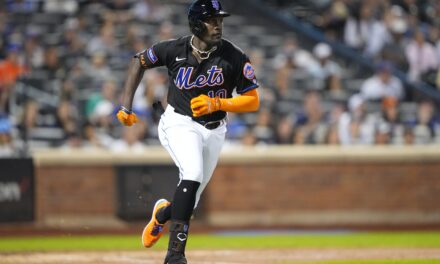
Mandatory Credit: Brett Davis-USA TODAY Sports
Does Tomás Nido need to be the Mets starting catcher? If he does, it puts the Mets in two strange positions at once.
The Mets spent $40 million a few months ago on James McCann, who batted .276/.334/.474 over 149 games in 2019 and 2020. The trouble is that McCann, 30 games into 2021, is batting .202/.269/.242, has hit about three fly balls all season, and has grounded into about 600,000,000 double plays.
These days, whenever McCann strikes out, Mets fans breathe a sigh of relief. For McCann, striking out, refusing to put his bat on the ball and ground into another double play, is a selfless act, the ultimate team-player move. In terms of self-sacrifice for the sake of the team, James McCann striking out is on par with Bruce Willis staying behind to detonate the bomb in Armageddon.
That’s the bad position: you don’t want to have to bench your sparkling new catcher 30 games into his tenure. At the same time, though, in Tomás Nido, the Mets might have something. It’s hard for me to believe that Nido has suddenly found himself as a hitter: even in the minors, he’s never had a great offensive season without the benefit of a high BABIP. He’s batting .288/.354/.559 over 2020 and 2021, but that’s just a 22-game sample size. Such a small sample means that Nido’s available metrics are limited. Statcast rates him as an excellent pitch framer — in the 96th percentile — but also says that he hasn’t hit the ball particularly hard this season or last.
Still, though, Nido has started to look like quite the ballplayer. After a key home run to put the Mets ahead of the Braves on Tuesday and a clutch pinch-hit single on Wednesday, Nido’s career seems like it might be reaching a watershed moment.

Mandatory Credit: Brett Davis-USA TODAY Sports
So what do the Mets do? First, they can’t overreact. While Nido has looked good, McCann is coming off an excellent 2019 and 2020. Purely anecdotally, he’s also thrown the ball well so far this season. McCann can’t play every day if he’s going to continue hitting like he’s hit so far, but the Mets should also work to get his bat going, and prepare for a time when he starts hitting and needs a regular spot in the lineup.
At the same time, this is one of those moments when the Mets should ask themselves: what more does Nido need to do to earn playing time? He has an .913 OPS since last season, and he’s coming up clutch and looking like a professional hitter. Obviously, 22 games is a small sample size, but the solution to that isn’t to deny that Nido’s success ever existed: it’s to see what he looks like over a larger sample size. The Mets need to get Nido at-bats to learn whether his momentary success will last beyond a few games; they also need to get McCann at-bats, to see whether he can find his way out of his momentary failure.
Fortunately, catching, what with its toll on the knees, lends itself to multiple players splitting time. But the Mets still need to figure out exactly what that split should be. How much playing time should Nido get, based on being in the middle of what might be a hot streak? How much time should McCann get, meanwhile, based on two excellent seasons that he hopefully hasn’t left in the past?
The answer, as usual, is complicated. Nido and McCann’s career splits don’t help differentiate them: both hit vastly better against left-handed pitching, and their respective numbers against hard-throwing pitchers, finesse pitchers, fly-ball pitchers, and ground-ball pitchers don’t help answer the question either. All the Mets have are their raw stats, and the contexts in which they’ve come.
So what do they do with that? It’s simultaneously simple and complicated: they split the time. They split it more or less evenly. If McCann starts hitting and Nido slumps back to his past self, McCann gets more time; if Nido keeps hitting and McCann doesn’t start, then Nido takes on more of the Mets’ catching duties. Forget the contracts and the histories: the Mets should pretend they met their two catchers yesterday, and start one anew with a starting job audition. Right now, both Nido and McCann are unknown quantities.
The Mets need to figure out what each has to offer, and the only way to do that is to give each of them time on the field and see what happens. Nido needs playing time because the Mets need to know whether his current numbers are for real. McCann needs playing time because the Mets are hoping desperately that his current numbers are not.














